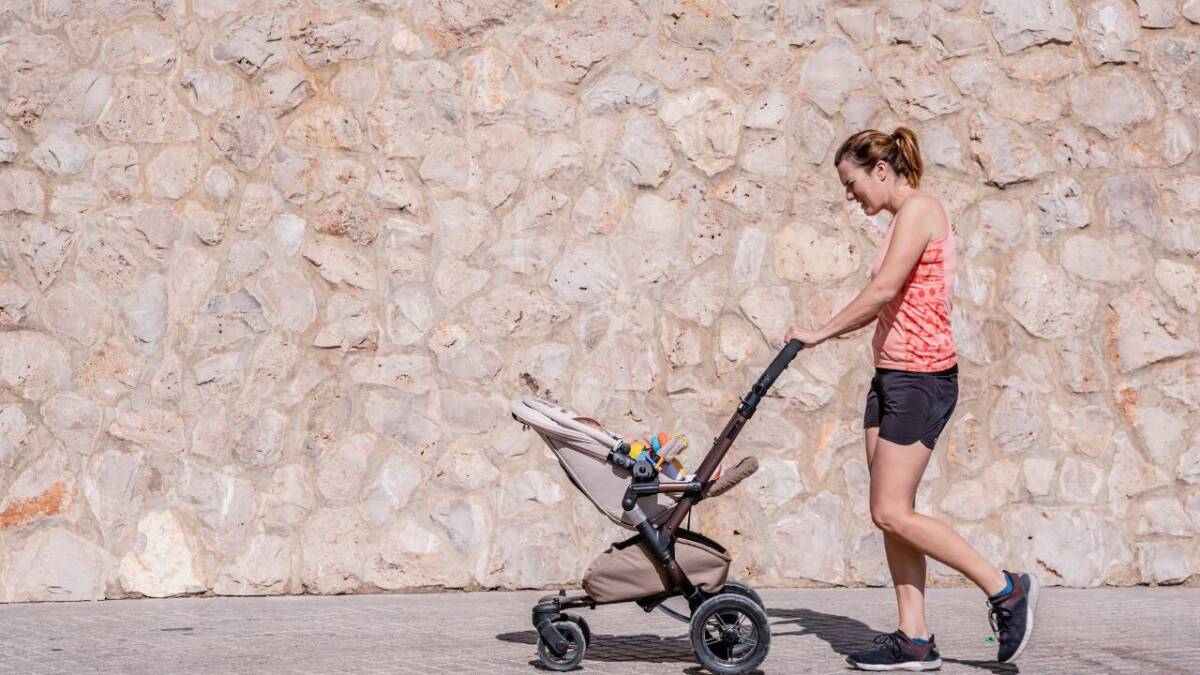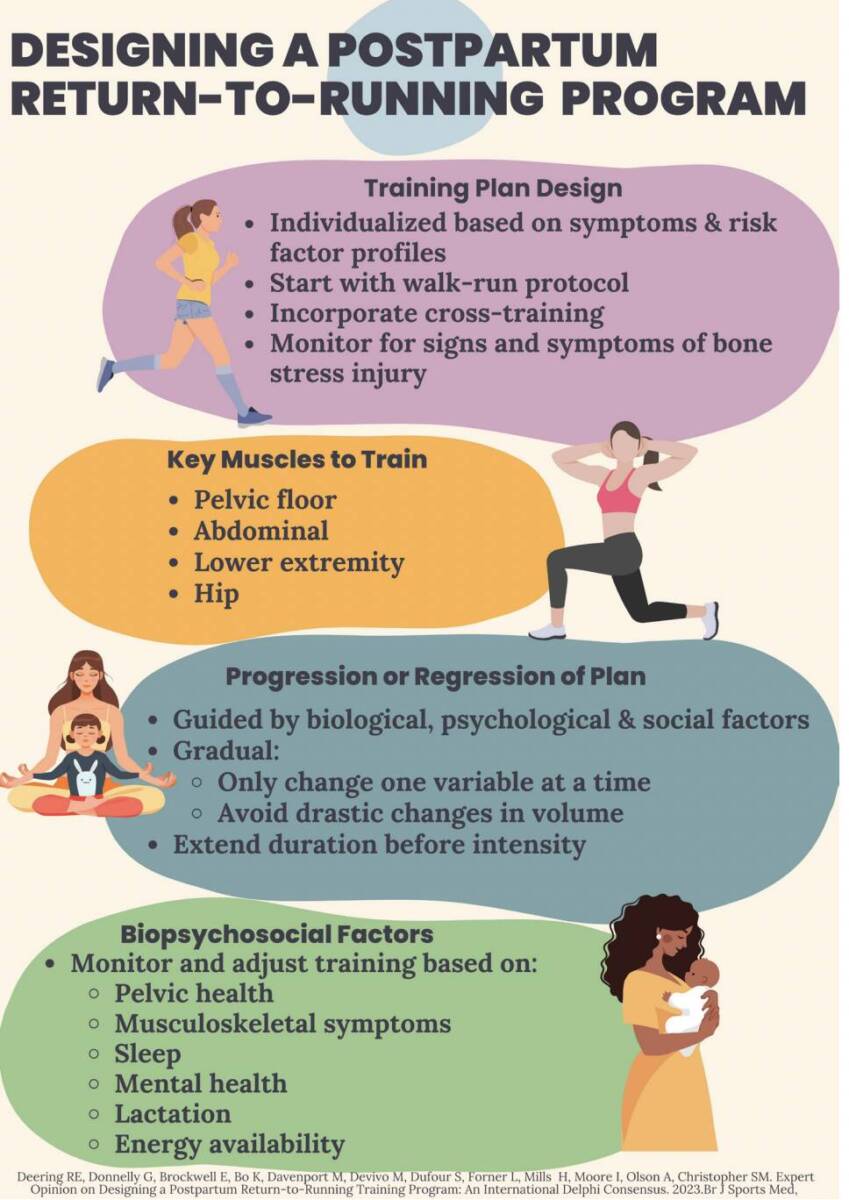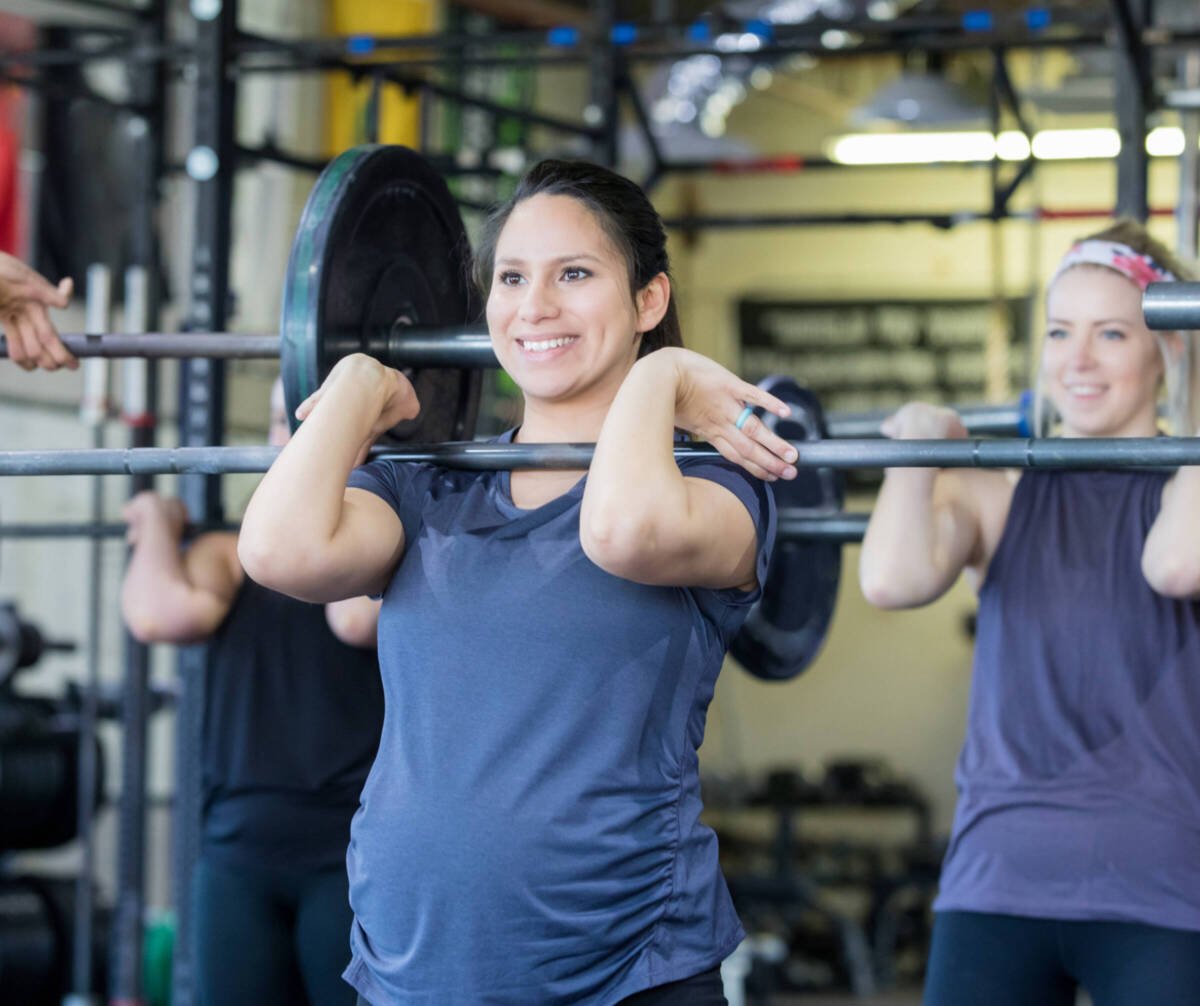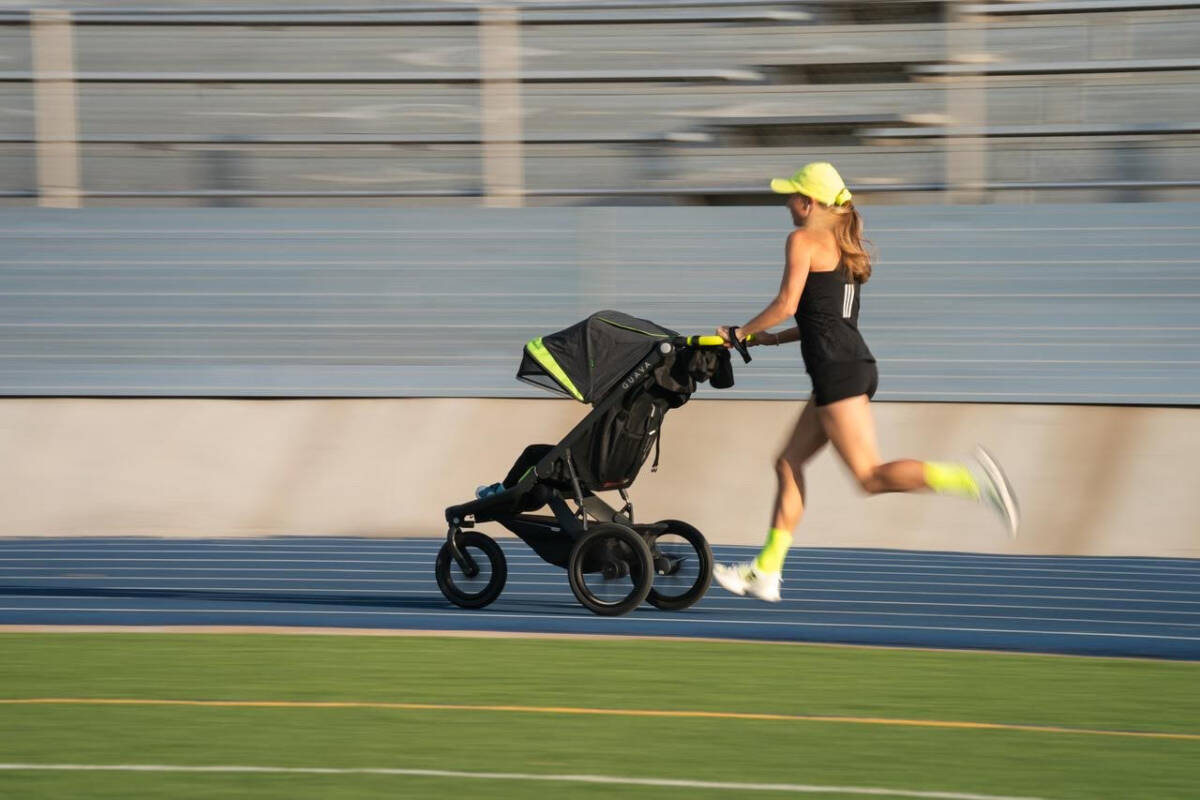6 Weeks: Too Soon to Start Running After Having a Baby?
Six weeks used to be what women thought they needed to wait to return to running after having a baby. But waiting 12 weeks longer may be prudent to allow the body to recover for high-impact exercise like running, research shows. Four postpartum experts weigh in on how long a mother should wait to resume running after childbirth.

Reviewed by Dr. Carrie Pagliano, DPT & Eva Heider, CPT, CPPC — When you can you return to running after having a baby? The general assumption is that most runners are safe to return to running at six weeks postpartum. But is this too soon? I will be the first to admit that I started running postpartum 6 weeks after having both of my children. Running was the only time I felt like myself postpartum. I needed it for my mental health.
To be fair, I had never even heard of a pelvic floor during this time. Much more education about the importance of the pelvic floor and core has happened since then, thank goodness.
Table of contents
- Is 6 weeks too soon to start running after having a baby?
- 4 Postpartum Experts Weigh In: Can You Start Running at 6 Weeks Postpartum?
- The Case for Waiting 12 Weeks to Run Postpartum
- Postpartum Screening Resources
- How can I tell if I am ready to run after having a baby?
- Factors That You May Need to Wait Longer Than 6 Weeks to Return to Running Postpartum:
- Red Flags You Aren’t Ready to Run Postpartum:
But flash forward several years and I am stuck in an injury cycle that began about two years after having my second child when I started running at a higher level. I’ve since learned that my pelvic floor suffered an injury during the birth process and my deep core muscles are weak and lack proper muscle coordination. For this reason, my body isn’t stabilized when running which has likely led to my injuries (this, despite being very diligent about strength training, including core).
Should I have waited longer than 6 weeks to start running after having a baby (even though my OB GYN cleared me)? Should you?
That’s what this article sets out to answer. I conducted research and consulted four postpartum experts to share their insights. It’s important to note that every BODY and PREGNANCY is different. Comparing one’s postpartum running journey to someone else’s (or even to your past self) is futile.
It’s also important to note that I am not a doctor or physical therapist, though I did consult them and research for this article. That said, if you have any health concerns, see a healthcare professional. (Learn more about finding a pelvic floor physical therapist here).
Is 6 weeks too soon to start running after having a baby?
Some women may be able to return to running safely at 6 weeks postpartum, or even or even three weeks postpartum. However, waiting 12 weeks to return to running after having a baby is being more widely adopted by doctors and physical therapists, as recommended by physical therapist and running expert Tom Goom and his colleagues in this well-researched guide.
This is because research shows the body has not healed enough at 6 weeks postpartum for high-impact exercise such as running. (More on that below).
As a running coach, I have coached women who have safely returned to running six weeks postpartum. These women worked with a pelvic floor physical therapist during pregnancy and postpartum. I will not have an athlete return to running at six weeks postpartum who has not worked with a pelvic floor PT and been cleared to run by her.
Women who have had a c-section need to wait at minimum 8 weeks to return to running.
To be frank, it’s ridiculous how little guidance women have when returning to running postpartum. They are left reading articles like this and thinking a pelvic floor physical therapist is a luxury rather than a necessity. Working with one during pregnancy and postpartum should be part of a woman’s standard rehabilitation program.
4 Postpartum Experts Weigh In: Can You Start Running at 6 Weeks Postpartum?
Shefali Christopher, PT, DPT, PhD, LAT, ATC, Board-Certified Sports Clinical Specialist & Assoc. Professor at Tufts University:
“I really think we need to start moving away from strict timelines and thinking of tissue healing guidelines. If someone has a complicated delivery (e.g. significant tearing etc) and pregnancy where they were not allowed to run, their return may be different than someone who ran up to the day they delivered and had a vaginal delivery with no tearing or complications. I often think of it like returning from a hamstring strain or stress fracture.
Some setbacks may require more rehab and time (for the bone to heal) while some things may be just a few days of rehab. Either way listening to your body and other factors (sleep, fatigue, mental health etc.) are going to be a big part of this return. Finding a coach and a physical therapist might be an excellent investment, so they can weigh all the factors and take on that mental load! Lastly, physical activity IS so important for physical and mental health of the mom that starting some exercise gentle and slowly progressing based on symptoms should be a priority!”
Eva Heider, Certified Personal Trainer and Certified Pre- and Postnatal Coach:
“Yes, 6 weeks is too soon after having a baby to start running! The body is still healing. Those healing processes might not be obvious but there is still so much going on in a mother’s body that cannot be seen. Besides the hormonal fluctuation, the major lifestyle changes during the newborn and infant phase, and other aspects, the deep core (pelvic floor, transverse abdominis as the inner part of the abdominal wall, diaphragm – the bodies biggest breathing muscle, multifidus muscles along the spine) is still in full blown recovery mode.
And the most important point to this is: the deep core at 6 weeks postpartum is not able to support a mother during a high impact activity like running. Healing the deep core, and the rest of the body during those first months is essential for a long, healthy, and strong future as a (mother) runner.”
Dr. Carrie Pagliano, doctor of physical therapy and pelvic health expert:
“It really depends. First time in postpartum, unless it’s your day job, unless you and your baby are sleeping (soundly) eating like a champ, you’re eating like a champ, you’ve had minimal tissue damage and cleared a readiness screen both physically and mentally…with GUIDANCE, there’s a space and a place for before 6 weeks. I’m more likely to support it if you’ve gone through a few pregnancies, it’s not your first rodeo at postpartum (again, passing a physical and mental screen and WITH SUPPORT).
I think we have a lot of opportunities to get more active when appropriate in those first 6 weeks, but honestly, it’s better used in taking time to heal, reconnect with your body and core, and build some foundational coordination and strength earlier…THEN look ahead to a readiness for running after 6 weeks. If we look at some recent examples like Steph Bruce, she had A LOT of guidance and support and it definitely wasn’t her first rodeo. She was realistic and her running didn’t always come first. The long and the short of it for me is that it’s not worth it in the long run, and it’s such a brief period of time, there’s far more that can go wrong than that can be gained in that time.
Rachel Pope, doctor of physical therapy, specialist in pregnancy and postpartum, and running coach:
“I just can’t stand by when moms get poor guidance or no guidance on rehabbing their core and pelvic floor before starting to run again. This must be done before returning to running. I want to shift this so that all moms can get back to running again without pelvic floor symptoms or the frustrations and disappointments that so many experience along the way. As a physical therapist/ultramarathoner/triathlete,
I felt like a failure when I couldn’t get back to running for more than a year after I had my second baby…when my OB and a pelvic floor physical therapist were telling me I was doing all the right things when clearly I wasn’t. That was the turning point for me in my career and my running journey. Women need guidance in their return to running postpartum.”
The Case for Waiting 12 Weeks to Run Postpartum
Returning to running too soon after giving birth can increase risk of injury and increase risk of pelvic floor dysfunction nearly five-fold as compared to low impact exercise such as walking (source).
Research shows that our bodies undergo immense changes during pregnancy and childbirth that take time to reverse, heal, and re-strengthen postpartum—much longer than 6 weeks (source). Some of these changes include:
- Postural changes including limited thoracic rotation and excessive anterior/posterior pelvic tilting
- Widened levator hiatus (middle of pelvis) which takes up to 12 months to return to similar placement
- Soft tissue injury which is only 75 percent healed at 6 weeks, and
- Core and pelvic floor weakening
- Scar tissue from a c-section takes 6-7 months to regain about three quarters of tensile strength.
Postpartum Recovery Timeline
According to Heider and Goom, there are several areas a mother can work in the first 12 weeks to ready her body for running:
1. See a pelvic floor physical therapist.
2. Walk (with your baby and without). Start with short walks and build over time. Hills are also a great way to ready the body for impact of running.
3. Rest as much as possible to allow the body to heal. Eat well, too.

4. At 6-8 weeks, begin a low-impact postpartum strength program that work to retrain and strengthen the deep core and pelvic floor, along with your glutes, hamstrings, calves, all the muscles in your hips, train for mobility and for stability. I love ReCORE and Get Mom Strong.
5. Perform a screening at the 3 month mark to assess potential trouble areas.
6. Give yourself the permission to ask for help during the first six to eight weeks (and beyond) after having a baby. (This is something I wish I did much sooner!!).
Postpartum Screening Resources
- Postnatal Return to Running – The Screening Checklist by Empowered Motherhood
- Returning to Running Postnatal Guide
- Assessing Diastasis Recti by Girls Gone Strong
- 4 Phase Rehabilitation Program for Postpartum Runners by Dr. Shefali Christopher
- Dr. Carrie Pagliano’s 10-Step Postpartum Screen
- Exercise to reconnect breath to your core (Heider notes this is a very important exercise that can help start the healing process of your core and can be done every day, from the first day after birth.)
- Diastasis Recti Test by my coach Neely Gracey. DR is common until 9 months postpartum however a dysfunctional diastasis recti beyond may lead to instabilities and injuries. I JUST found out I have DR eight years after giving birth–and it is quite possibly behind my injury cycle.
- Prenatal & Postnatal Strength Program with reCORE Fitness
- Diastasis Rehab Program with Every Mother
How can I tell if I am ready to run after having a baby?
Reminder: given the nuance and individuality of recovering from pregnancy and birth, the best way to know when you should return to running is to consult with a pelvic floor physical therapist. However, for you to get an idea of if you are ready to return to running postpartum, you can perform Goom, et al.’s test:
Complete the following without pain, heaviness, dragging, or incontinence:
- Walking 30 minutes
- Single leg balance 10 seconds
- Single leg squat 10 repetitions each side
- Jog on the spot 1 minute
- Forward bounds 10 repetitions
- Hop in place 10 repetitions each leg
- Single leg ‘running man’: opposite arm and hip flexion/extension (bent knee) 10 repetitions each side
Aim for 20 repetitions of each test below:
- Single leg calf raise
- Single leg bridge
- Single leg sit to stand
- Side lying abduction
If you can complete these movements without issues, you may be close to ready to run. A pelvic floor physical therapist can help ensure you are ready to run, or help with trouble areas.
Specifically, if you see a pelvic floor specialist (which you should!), they should perform a gait analysis; an internal exam to assess pelvic floor strength, endurance and co-ordination; and asses your posture and breathing to decide if you are ready to start running after baby.
If you do not have access to a local pelvic floor specialist, there are many at-home and remote options available such as Dr. Carrie Pagliano, a physical therapist and pelvic floor specialist.
Factors That You May Need to Wait Longer Than 6 Weeks to Return to Running Postpartum:
- Being overweight
- Suffering from postpartum depression
- Sleep deprivation
- Breastfeeding
- RED/s (or a history of REDs)
- Heaviness, dragging, incontinence or moderate to severe pelvic pain
- Musculoskeletal injury
- Low fitness level
- Chest breathing over belly breathing
Red Flags You Aren’t Ready to Run Postpartum:
According to research, the following are red flags that you are not ready to start running after having a baby (source):
- leaking urine or feces
- heaviness/dragging in the pelvic area
- pain with intercourse
- obstructive defecation
- abdominal separation compromising abdominal function
- lumbopelvic pain that exists before, during or after running
The last thing I ever want to do is be a dream crusher. But if you are anxious to start running after having a baby, I beg you to do your pelvic floor due diligence before you begin. Otherwise, you risk taking more time off running during to injuries that could have been avoided.
When did you start running postpartum?





This article is great!!! As (well) said in the article, every body is different and everyone’s pregnancy is different. It may take some people less time that others to start running and we should stop thinking about return as a timeline but more as phases of recovery. So early phase doesn’t mean that you sit around and do nothing (if cleared by medical provider). You can start to rehab all your muscles (core, pelvic floor, lower extremity etc) so that when your do start running you are strong as a mother ;). A slow progression to see how the body reacts is an also important! Getting a coach/physical therapist at this time might be a super investment. I often think of rehabilitation after a baby like any other running injury that may keep us out of running. A simple ankle sprain could be a week’s worth of rest time but a bone stress injury may be weeks. If you rush any of them, the results may be two steps forward one step back!! But for your physical and mental health, like during injury time off, finding some physical activity/ x training that feels good for your body is great for your physical and mental health <3
Great job with this article!
Thank you so much for sharing your input as I know this is a topic well researched by you! I have found the injury analogy to be so accurate in practice as someone who has battled injuries in recent years following having babies. The mindset and progression is often the same. Finding a good team to work with and support you is so vital! Thanks, Shefali!